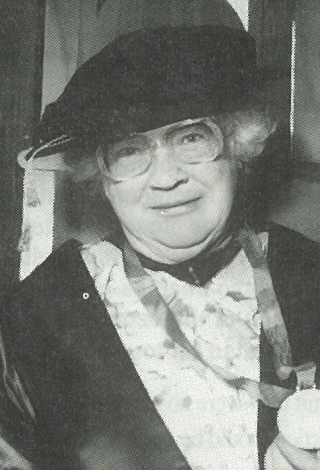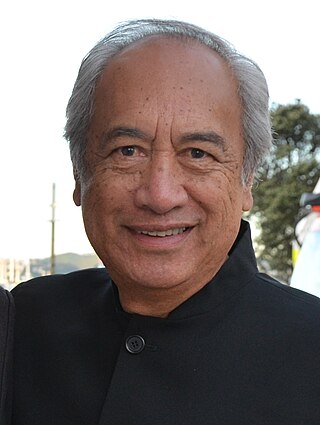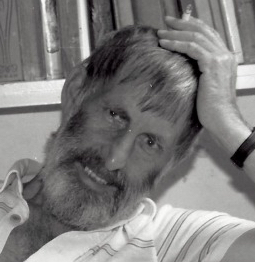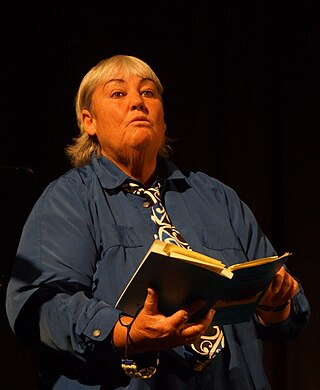
New Zealand literature is literature, both oral and written, produced by the people of New Zealand. It often deals with New Zealand themes, people or places, is written predominantly in New Zealand English, and features Māori culture and the use of the Māori language. Before the arrival and settlement of Europeans in New Zealand in the 19th century, Māori culture had a strong oral tradition. Early European settlers wrote about their experiences travelling and exploring New Zealand. The concept of a "New Zealand literature", as distinct from English literature, did not originate until the 20th century, when authors began exploring themes of landscape, isolation, and the emerging New Zealand national identity. Māori writers became more prominent in the latter half of the 20th century, and Māori language and culture have become an increasingly important part of New Zealand literature.

Janet Paterson Frame was a New Zealand author. She is internationally renowned for her work, which includes novels, short stories, poetry, juvenile fiction, and an autobiography, and received numerous awards including being appointed to the Order of New Zealand, New Zealand's highest civil honour.

Maurice Francis Richard Shadbolt was a New Zealand writer and occasional playwright.

Maurice Gough Gee is a New Zealand novelist. He is one of New Zealand's most distinguished and prolific authors, having written over thirty novels for adults and children, and has won numerous awards both in New Zealand and overseas, including multiple top prizes at the New Zealand Book Awards, the James Tait Black Memorial Prize in the UK, the Katherine Mansfield Menton Fellowship, the Robert Burns Fellowship and a Prime Minister's Award for Literary Achievement. In 2003 he was recognised as one of New Zealand's greatest living artists across all disciplines by the Arts Foundation of New Zealand, which presented him with an Icon Award.

Frank Sargeson was a New Zealand short story writer and novelist. Born in Hamilton, Sargeson had a middle-class and puritanical upbringing, and initially worked as a lawyer. After travelling to the United Kingdom for two years and working as a clerk on his return, he was convicted of indecent assault for a homosexual encounter and moved to live on his uncle's farm for a period. Having already written and published some short stories in the late 1920s, he began to focus on his writing and moved into his parents' holiday cottage where he would live for the rest of his life.
Alistair Te Ariki Campbell ONZM was a poet, playwright, and novelist. Born in the Cook Islands, he was the son of a Cook Island Māori mother and a Pākehā father, who both died when he was young, leading to him growing up in a New Zealand orphanage. He became a prolific poet and writer, with a lyrical and romantic style tempered by a darkness borne out of his difficult childhood and struggles with mental health as a young adult. Although he wrote about Māori culture from his earliest works, after a revelatory return to the Cook Islands in 1976, his later works increasingly featured Pasifika culture and themes. He received a number of notable awards during his lifetime including the New Zealand Book Award for Poetry and Prime Minister's Award for Literary Achievement, and is considered one of New Zealand's foremost poets as well as a pioneer of Pasifika literature written in English.

Witi Tame Ihimaera-Smiler is a New Zealand author. Raised in the small town of Waituhi, he decided to become a writer as a teenager after being convinced that Māori people were ignored or mischaracterised in literature. He was the first Māori writer to publish a collection of short stories, with Pounamu, Pounamu (1972), and the first to publish a novel, with Tangi (1973). After his early works he took a ten-year break from writing, during which he focused on editing an anthology of Māori writing in English.

Christian Karlson "Karl" Stead is a New Zealand writer whose works include novels, poetry, short stories, and literary criticism. He is one of New Zealand's most well-known and internationally celebrated writers.
The Ockham New Zealand Book Awards are literary awards presented annually in New Zealand. The awards began in 1996 as the merger of two literary awards events: the New Zealand Book Awards, which ran from 1976 to 1995, and the Goodman Fielder Wattie Book Awards, which ran from 1968 to 1995.

Dame Fiona Judith Kidman is a New Zealand novelist, poet, scriptwriter and short story writer. She grew up in Northland, and worked as a librarian and a freelance journalist early in her career. She began writing novels in the late 1970s, with her works often featuring young women subverting society's expectations, inspired by her involvement in the women's liberation movement. Her first novel, A Breed of Women (1979), caused controversy for this reason but became a bestseller in New Zealand. Over the course of her career, Kidman has written eleven novels, seven short-story collections, two volumes of her memoirs and six collections of poetry. Her works explore women's lives and issues of social justice, and often feature historical settings.

Landfall is New Zealand's oldest extant literary magazine. The magazine is published biannually by Otago University Press. As of 2020, it consists of a paperback publication of about 200 pages. The website Landfall Review Online also publishes new literary reviews monthly. The magazine features new fiction and poetry, biographical and critical essays, cultural commentary, and reviews of books, art, film, drama, and dance.
Elizabeth Edwina Smither is a New Zealand poet and writer.
Michael James Terence Morrissey is a New Zealand poet, short story writer, novelist, essayist, editor, feature article writer, book reviewer and columnist. He is the author of thirteen volumes of poetry, two collections of short stories, a memoir, two stage plays and four novels and he has edited five other books.
Marilyn Rose Duckworth is a New Zealand novelist, poet and short story writer. Since her first novel was published at the age of 23 in 1959, she has published fifteen novels, one novella, a collection of short stories and a collection of poetry. Many of her novels feature women with complex lives and relationships. She has also written for television and radio. Over the course of her career she has received a number of prestigious awards including the top prize for fiction at the New Zealand Book Awards for Disorderly Conduct (1984) and a Prime Minister's Award for Literary Achievement in 2016.
Rachel Phyllis McAlpine is a New Zealand poet, novelist and playwright. She is the author of 30 books including poetry, plays, novels, and books about writing and writing for the internet.

James Henry George Chapple was a Unitarian minister, former Presbyterian minister and pacifist. He was charged with making seditious utterances in 1917 and imprisoned for 11 months, and was the inspiration for the character George Plumb in the Plumb trilogy written by his grandson Maurice Gee. He was one of only two New Zealanders nominated for the Nobel Peace Prize before 1956.

Robin Nelson Dudding was a New Zealand literary editor and journalist who founded the influential literary journal Islands (1972–1988).
Michael Gifkins was a New Zealand literary agent, short story writer, critic, publisher and editor. Having written three collections of short stories himself in the 1980s, Gifkins later represented a number of leading New Zealand writers, including Lloyd Jones. After his death, the New Zealand Society of Authors established the Michael Gifkins Prize for an Unpublished Novel which is awarded annually.
Lisa Greenwood is a New Zealand novelist. She was the 1990 recipient of the Katherine Mansfield Menton Fellowship, one of New Zealand's foremost literary awards.

Cathie Koa Dunsford is a New Zealand novelist, poet, anthologist, lecturer and publishing consultant. She has edited several anthologies of feminist, lesbian and Māori/Pasifika writing, including in 1986 the first anthology of new women's writing in New Zealand. She is also known for her novel Cowrie (1994) and later novels in the same series. Her work is influenced by her identity as a lesbian woman with Māori and Hawaiian heritage.













